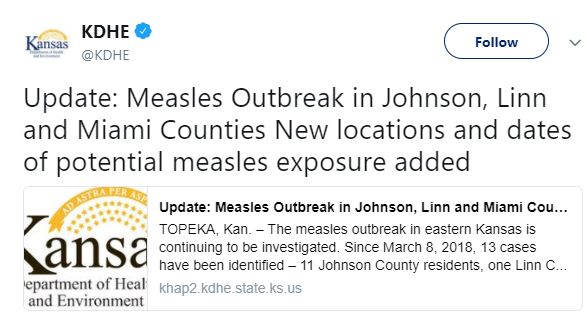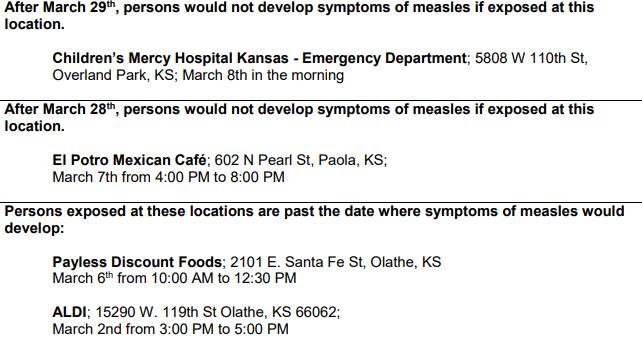Three additional measles cases are being investigated in Johnson County, Kansas, health officials report. This brings the total cases in eastern Kansas to 13 – 11 Johnson County residents, one Linn County resident and one Miami County resident since early March.
State health officials advise the public that if a person has visited one or more of the locations below, on the dates and times listed, they may have been exposed to measles:
Symptoms of measles typically begin with a high fever, cough, runny nose, and red watery eyes. Three to five days after symptoms begin, a rash develops and usually starts on the face at the hairline and spreads down to the neck, trunk, arms, and legs.
 To date, KDHE along with the Johnson County Department of Health and Environment, Linn County Department of Health, and the Miami County Department of Health have been able to identify where and when each case became infected. KDHE urges people who are ill or exhibiting measles-like symptoms to stay at home unless they are seeking medical care.
To date, KDHE along with the Johnson County Department of Health and Environment, Linn County Department of Health, and the Miami County Department of Health have been able to identify where and when each case became infected. KDHE urges people who are ill or exhibiting measles-like symptoms to stay at home unless they are seeking medical care.
Before visiting a healthcare provider, call ahead and let the provider know of the measles exposure so that the measures can be taken to protect other patients and staff. This outbreak continues to be investigated and KDHE and county health departments are working to identify contacts.
The average number of days between when a person is exposed to measles, and when they first start showing symptoms is approximately 10 to 14 days (range of 7 to 21 days). Secondary cases are now appearing outside of the daycare. There is concern that some individuals in the general population may have potentially been exposed to persons with measles while they were infectious.
Measles is a respiratory disease caused by a virus. Measles is spread through the air by breathing, coughing or sneezing. Measles can be spread to others from four days before to four days after the rash appears. Measles cannot be spread to others by people who do not have the disease. The best way to prevent measles is to get the MMR vaccine. Currently, KDHE is not recommending any changes to the routine vaccination schedule. If you have had measles or have been vaccinated, your risk of contracting the disease is extremely low.





One thought on “Measles update: Additional cases and locations of possible exposure”